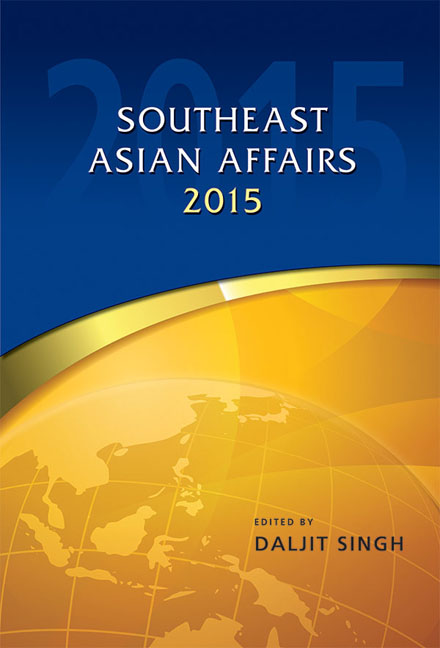Book contents
- Frontmatter
- Contents
- Foreword
- Introduction
- Acknowledgements
- THE REGION
- BRUNEI DARUSSALAM
- CAMBODIA
- INDONESIA
- Indonesia in 2014: Jokowi and the Repolarization of Post-Soeharto Politics
- Junctures of the Old and New: The 2014 Indonesian Elections
- ISIS in Indonesia
- LAOS
- MALAYSIA
- MYANMAR
- THE PHILIPPINES
- SINGAPORE
- THAILAND
- TIMOR-LESTE
- VIETNAM
ISIS in Indonesia
from INDONESIA
Published online by Cambridge University Press: 19 May 2017
- Frontmatter
- Contents
- Foreword
- Introduction
- Acknowledgements
- THE REGION
- BRUNEI DARUSSALAM
- CAMBODIA
- INDONESIA
- Indonesia in 2014: Jokowi and the Repolarization of Post-Soeharto Politics
- Junctures of the Old and New: The 2014 Indonesian Elections
- ISIS in Indonesia
- LAOS
- MALAYSIA
- MYANMAR
- THE PHILIPPINES
- SINGAPORE
- THAILAND
- TIMOR-LESTE
- VIETNAM
Summary
A steep decline in terrorist acts in Indonesia in 2014 should have been good news, especially because it underscored that police vigilance was high and extremist capacity was weak. But a third factor was also involved that was not such good news: more extremists were focused on getting to Syria and joining what they believed was a more important jihad than any they could wage at home. By late 2014, about 100 Indonesians, possibly more, were believed to have left to fight in Syria, some with their wives and children, and most to join the Islamic State.
Violent Extremists in Indonesia in 2014
By early 2014, Indonesia's jihadist community was divided between those who supported violence inside Indonesia, with the police as the primary target, and those who believed that at least for the moment, violence at home was counterproductive. The former generally supported the Islamic State and its predecessor, the Islamic State in Greater Syria and Iraq (ISIS). The latter were more likely to support IS's main rival in Syria, the al-Nusra Front, and its allies.
Prominent in the first group was Mujahidin Indonesia Timur (MIT), a group of some thirty armed men led by Santoso alias Abu Wardah in the hills outside Poso, Central Sulawesi. Santoso had run a series of military-style training camps in Poso beginning in 2011, and graduates and supporters are now scattered across Java, Sumatra, Sulawesi and Nusa Tenggara Barat (NTB). Despite being effectively under police siege during the year in his jungle camp, Santoso managed to smuggle out videos periodically to YouTube and radical websites. While neither he nor any other group managed any bombings in 2014, the few attacks on police during the year were all linked to MIT. Santoso was the first Indonesian to publicly pledge loyalty to the Islamic State after its leader, Abubakar al-Baghdadi, announced the establishment of the new caliphate on 29 June 2014 (1 Ramadan).
The pro-violence group also included remnants of Mujahidin Indonesia Barat (MIB), many members of which had previous ties to an old Darul Islam network led by the now-imprisoned Abdullah Umar. It included some but not all members of Abu Bakar Ba'asyir's organization, Jamaah Anshorul Tauhid (JAT), and many followers of the imprisoned cleric Aman Abdurrahman who had no specific organizational affiliation.
- Type
- Chapter
- Information
- Southeast Asian Affairs 2015 , pp. 154 - 164Publisher: ISEAS–Yusof Ishak InstitutePrint publication year: 2015

